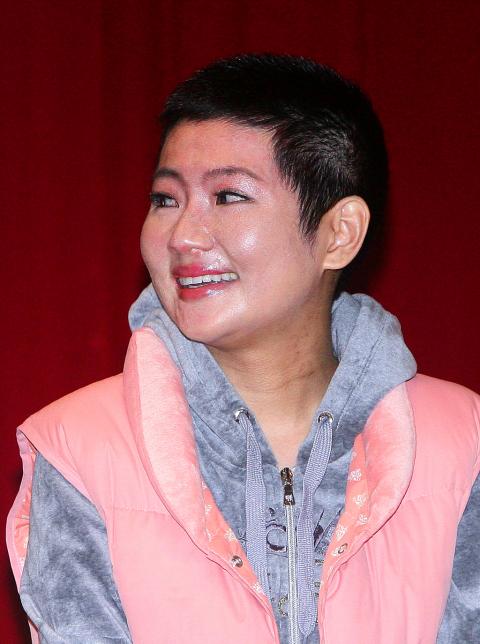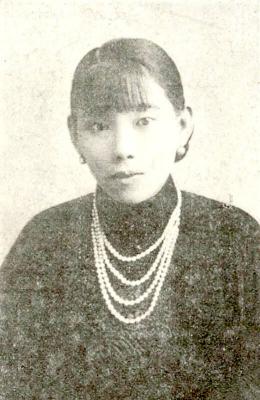The big news this week was the re-emergence of pop star Selina Jen (任家萱). Not that she’s really been out of the picture since she suffered burns to 54 percent of her body after an accident while shooting a film in Shanghai. The traumatic nature of her injuries and the passionate support that her circumstances have generated among fans have given the whole episode the air of a soap opera. For her first appearance in public after 88 days on Wednesday, the media was geared up for a feeding frenzy.
Chen Ming-chang (陳銘章), the director of I Have a Date With Spring (我和春天有個約會), the film which was being shot when the accident took place, has maintained a low profile since the mishap. This has not proven a particularly effective strategy, for he has been accused of shirking his responsibilities and generally acting like a wimp. He recently made matters worse by posting an extended 2,000 word public apology online. Jen’s friends and fans have jumped on this as a further example of his spinelessness — he has yet to stand forth and face the full wrath of the press pack — but he has also managed to anger fans of Yu Haoming (俞灝明), Selina’s costar who was also injured in the incident. Yu remains in Shanghai undergoing treatment.
Chen has responded by saying that he didn’t make sufficient mention of Yu in the apology simply because it was written in response to reports of Jen’s imminent release from hospital. Fans of both victims are far from appeased. Nevertheless, Chen may lose his position as arch villain after online posts by the assistant director, cameraman and others dismissing Jen’s fans as “crazy people.”

Photo: Taipei Times
It has been suggested that Chen already has another project in the works, and the apology was just his way of moving on from what he probably hopes is just a hiccup in his career.
TV show host and Chen Ming-chang’s friend Chen Wei-min (陳為民) fanned the flames with an ill-advised blog posting that contained comments like: “I know you’re famous. I know you’ve had a hard time. But is it right to attack people like that?” and “He is at fault, but the fault is not all his. Are you going to make accusations at his superiors?” Although the posts made no reference to Jen or Chen Ming-chang, the timing has made the association unavoidable. Chen Wei-min has since denied that the posts referred to Jen, but this hasn’t stopped him from coming under attack for using the incident to gain media exposure for himself.
Subsequent speculation has suggested that the posts might actually have been directed at Ella Chen (陳嘉樺), Selina’s bandmate from S.H.E, who has been particularly harsh in her criticism of Chen Ming-chang for his delay of nearly three months before making a public apology. Will the truth ever be known? The way all those involved are micro-blogging their every thought and action, there is plenty of grist for the gossip mill.
On the bright side, Jen’s fiance Richard Chang (張承中) has stood steadfastly by her through this difficult time. According to Now.com, Jen’s father even broached the subject of calling off the engagement in the light of his daughter’s terrible injuries, but Chang wasn’t looking for a way out. Although Chang was not at Jen’s side for her first press conference, her father was full of praise for his future son-in-law.
At the press conference, Linda Ho (何燕玲), general manager of HIM International Music (華研國際音樂), said that negotiations were still in progress with Hunan TV (湖南衛視), the Chinese TV station who had commissioned I Have a Date With Spring, about compensation.
Although Jen is now out of hospital, Chinese media quoted hospital authorities as saying she will have to return for checkups every week for the next six months and that they would not rule out the possibility of further surgery.
Meanwhile, Jay Chou (周杰倫) was in Beijing this week promoting his latest film The Green Hornet, which judging by reviews coming in from the US and UK, is going to need all the promoting it can get. (It is scheduled to open here next week.) Roger Ebert gives it just one star and describes it as “an almost unendurable demonstration of a movie with nothing to be about.” This sentiment is widely supported by other established critics. Chou gets neither praise nor blame, for he is not able to stand out amid the barrage of criticism directed at lead actor and cowriter Seth Rogen and director Michel Gondry. In fact, according to Sina.com, the Internet Movie Database even had Chou confused with a South Korean actor at one stage, though the error now seems to have been corrected. In an interview, the Chairman said he was unperturbed by his lack of recognition in the West. “This is the way into the Western market,” he said, “Why else would I act in a Hollywood film?”
Chou, Taiwan’s most eligible bachelor, also announced in the interview “that he has been single for too long.” “I sometimes get lonely,” he said. Behind every good businessman, there has to be a good woman, he said, or words to that effect. The news is out: J-girl wanted! His minimum requirement is that she must understand his music. “We need to understand the same language,” he said.

Many people noticed the flood of pro-China propaganda across a number of venues in recent weeks that looks like a coordinated assault on US Taiwan policy. It does look like an effort intended to influence the US before the meeting between US President Donald Trump and Chinese dictator Xi Jinping (習近平) over the weekend. Jennifer Kavanagh’s piece in the New York Times in September appears to be the opening strike of the current campaign. She followed up last week in the Lowy Interpreter, blaming the US for causing the PRC to escalate in the Philippines and Taiwan, saying that as

US President Donald Trump may have hoped for an impromptu talk with his old friend Kim Jong-un during a recent trip to Asia, but analysts say the increasingly emboldened North Korean despot had few good reasons to join the photo-op. Trump sent repeated overtures to Kim during his barnstorming tour of Asia, saying he was “100 percent” open to a meeting and even bucking decades of US policy by conceding that North Korea was “sort of a nuclear power.” But Pyongyang kept mum on the invitation, instead firing off missiles and sending its foreign minister to Russia and Belarus, with whom it

The Chinese Communist Party (CCP) has a dystopian, radical and dangerous conception of itself. Few are aware of this very fundamental difference between how they view power and how the rest of the world does. Even those of us who have lived in China sometimes fall back into the trap of viewing it through the lens of the power relationships common throughout the rest of the world, instead of understanding the CCP as it conceives of itself. Broadly speaking, the concepts of the people, race, culture, civilization, nation, government and religion are separate, though often overlapping and intertwined. A government

Nov. 3 to Nov. 9 In 1925, 18-year-old Huang Chin-chuan (黃金川) penned the following words: “When will the day of women’s equal rights arrive, so that my talents won’t drift away in the eastern stream?” These were the closing lines to her poem “Female Student” (女學生), which expressed her unwillingness to be confined to traditional female roles and her desire to study and explore the world. Born to a wealthy family on Nov. 5, 1907, Huang was able to study in Japan — a rare privilege for women in her time — and even made a name for herself in the